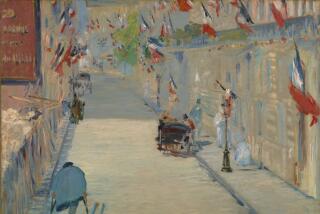Wet Paint by Gwynn Popovac (Houghton Mifflin: $18.95; 373 pp.)
- Share via
Flora Jackson is a teen-ager and aspiring painter imprisoned in the stultifying world of Suburban California in the 1960s. Her father maintains a perfectly manicured lawn but beats his children and intimidates his wife. This unbelievably misanthropic character also forbids his daughter to have intercourse--metaphorical or otherwise with the smoldering young mystic and painter Matthew, who has just moved in across the street. But Mr. Jackson only fuels this teen-age romance by forbidding it. Flora reads aloud from “Romeo and Juliet,” dreams erotic dreams, spends her waking hours scheming possible rendezvous, and works herself into a high romantic heat.
Flora’s repressive home life is mirrored at her school, where with the exception of one sympathetic art teacher, the institution’s raison d’etre appears to be to repress whatever human qualities have not yet been pulverized at home. Matthew and Flora find refuge in their beloved art class and in an off-limits storage room, where they undress and do what unsupervised teen-agers do. After about 300 pages detailing the trials and erotic exploits of the pair, the reader learns with some chagrin that the entire romance has taken place in Flora’s head.
Presumably, this revelation illustrates something about imagination triumphing over adversity, but sadly, young Flora’s imagination is not the wondrous thing it ought to be and cannot gracefully sustain such scrutiny. “My love for you burns hotter than the worst anger, and softer than candlelight,” Flora writes Matthew, after wishing that “she could take Matthew’s hand and run with him through open fields.” In a novel that expressly tackles “Art” and the “Imagination,” this kind of stale and florid imagery is particularly hard to overlook. Flora’s fantasies, like her paintings, are busy with feathers and fans, and the chapter headings sport such names as “Tattered Clouds,” “The Clay Ballerina” and “Jasmine Tea.” It is as if pop singer Stevie Nicks had been cast as the lead in the female version of the Sorrows of Young Werther.
Despite its erotic component, “Wet Paint” is a fundamentally passive book. Flora is always waiting--waiting to sneak out of the house, waiting for punishment by her father, waiting to grow up so she can get the heck out of there. Author Gwynn Popovac does accurately capture the impatience of adolescence, the sense of agonizing stasis and powerlessness that almost drives the heroine to despair. The oppressiveness and boredom of Flora’s life are palpable, but they wash over unavoidably into Popovac’s prose, and boredom is very seldom interesting. Popovac also has missed the chance to enliven the story with the natural comedy of adolescent passion. The author takes her heroine as seriously as the heroine does herself.
Structurally, the novel is peculiar, opening with a short prelude from the parents’ point of view, then shifting quickly to the daughter as protagonist. Occasionally the narrative leaves Flora’s consciousness and enters enigmatic Matthew’s brain, but these shifts are so infrequent that they are more jarring than enlightening. The epilogue jumps suddenly to first person and then back to third while shifting tenses arbitrarily and apparently without design. Most annoying of all, the revelation that Matthew and Flora’s romance was imagined leaves dozens of dramatic questions unresolved, and in the epilogue’s 30-odd pages, Popovac answers only some of them in a hasty, buckshot manner, leaving the reader--after so much waiting--agitated and unsatisfied.
More to Read
Sign up for our Book Club newsletter
Get the latest news, events and more from the Los Angeles Times Book Club, and help us get L.A. reading and talking.
You may occasionally receive promotional content from the Los Angeles Times.










